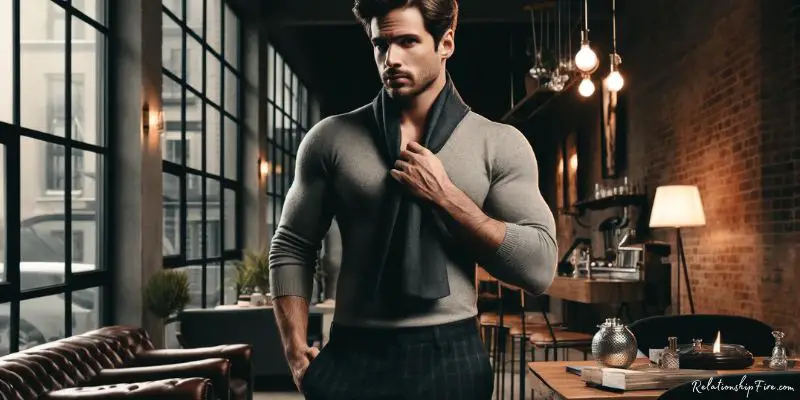Attracting emotionally unavailable guys can be a perplexing and often heart-wrenching pattern for many.
You might find yourself repeatedly entangled with partners who seem distant, disengaged, or simply incapable of forming an emotional bond. Drawing from over a decade of co-authored research and teaching evidence-based relationship skills, we’ll explore the core reasons behind this pattern.
1. Mirroring Parental Relationships

The relationships we observe and experience in childhood often set the groundwork for those we seek as adults.
If a primary caregiver, such as a father, was emotionally unavailable, this dynamic can feel familiar and, strangely, comforting.
It’s not about the emotional unavailability itself being appealing.
Instead, it’s about the subconscious attempt to recreate and resolve unresolved childhood issues.
This pattern suggests that our attraction to emotionally unavailable partners may be an attempt to heal past wounds through current relationships, often leading us to replicate rather than rectify these early experiences.
2. The Allure of the Unobtainable
Emotionally unavailable partners can often seem more desirable because they present a challenge.
This allure is rooted in human psychology, where we place a higher value on rewards we perceive as difficult to obtain.
In the context of relationships, emotionally unavailable individuals may appear more intriguing or desirable.
That’s because winning their affection seems like a significant achievement.
This can lead to a cycle where the individual is constantly chasing a form of validation and affection that remains just out of reach, mistaking this pursuit for love.
3. Subconscious Self-Protection
Choosing emotionally unavailable partners can be a subconscious strategy to shield oneself from the vulnerabilities of a deeper emotional connection.
By engaging with someone who is unlikely to demand emotional intimacy, you minimize the risk of getting hurt.
This approach is often rooted in past experiences of emotional pain or abandonment, leading to a protective mechanism that inadvertently keeps love at bay.
While this may seem like a safe way to avoid potential heartbreak, it also prevents the formation of truly fulfilling and emotionally rich relationships.
It’s not a good long-term strategy, in other words.
4. Misaligned Self-Esteem
Self-esteem significantly influences the types of relationships we believe we deserve.
If you struggle with low self-esteem, you might find yourself attracted to emotionally unavailable partners as a reflection of your own perceived unworthiness.
This attraction is not about the lack of desire for a deep connection.
But rather a belief that you’re not worthy of someone who is emotionally present and engaged.
This misalignment between self-worth and partner availability can create a cycle where one consistently chooses partners who reaffirm these negative self-beliefs, further entrenching the pattern of emotional unavailability.
5. The Dark Triad Fascination
Individuals exhibiting traits associated with the Dark Triad—narcissism, Machiavellianism, and psychopathy—often exude a mysterious or charismatic allure that can be intensely attractive.
These traits can lead to a display of confidence, charm, and excitement that masks their emotional unavailability.
The fascination lies in the challenge and the mistaken belief that one’s love can “heal” or change them.
Unfortunately, this attraction often overlooks the fundamental incompatibility in emotional needs and availability, leading to a relationship dynamic where emotional depth and reciprocity are lacking.
6. Fear of Commitment
Sometimes, the attraction to emotionally unavailable guys is a reflection of one’s own fear of commitment.
Engaging with someone who is unlikely to seek a deeper emotional connection can be a way to avoid confronting one’s fears regarding long-term commitment and vulnerability.
This mutual avoidance can create a superficially satisfying relationship that lacks depth and growth.
It’s a protective strategy that keeps relationships at a safe distance, preventing both partners from facing their vulnerabilities and commitment anxieties head-on.
7. Confusing Passion with Intensity

The initial stages of a relationship with an emotionally unavailable partner can be marked by high levels of intensity, which are often mistaken for passion.
This intensity, however, is not a sign of emotional depth but rather the volatility and uncertainty characteristic of such dynamics.
The roller-coaster nature of these relationships can be addictively exhilarating, leading one to equate these experiences with love.
I’ve been there multiple times.
Unfortunately, this confusion between passion and intensity creates cycles of highs and lows that lack the stability and mutual support found in healthy relationships.
8. The Savior Complex
Some individuals are drawn to emotionally unavailable partners out of a desire to be the one who finally breaks through their emotional barriers.
This “savior complex” is fueled by the belief that one’s love and effort can change someone’s ability to be emotionally present and engaged in a relationship.
However, this approach places an undue burden on one person to mend the emotional shortcomings of the other, often at the expense of their own emotional needs and well-being.
The focus on changing the partner can distract from the importance of mutual emotional availability and support.
9. Lack of Emotional Availability in Oneself
At times, the attraction to emotionally unavailable partners mirrors a lack of emotional availability within oneself.
This can stem from unresolved personal issues, fear of intimacy, or past traumas that have not been adequately addressed.
Engaging in relationships with emotionally unavailable individuals can be a subconscious way to avoid confronting one’s emotional blocks.
And the work needed to overcome them.
This pattern serves as a defense mechanism, preventing both individuals from engaging in the vulnerability and openness required for a healthy, emotionally connected relationship.
10. Valuing Independence Over Intimacy
For some, a strong value placed on independence can lead to a preference for partners who appear emotionally unavailable.
This preference is often rooted in a desire to maintain one’s sense of self and autonomy within a relationship.
However, when taken to an extreme, this valuation can inhibit the development of deep emotional connections.
The relationship may lack the closeness and mutual vulnerability that foster intimacy.
While independence is a healthy and important aspect of personal and relational well-being, balancing it with the ability to engage emotionally is crucial for meaningful connections.
11. The Challenge of Changing Dynamics
The challenge of changing an emotionally unavailable partner into a committed, emotionally present companion can be a driving force for some.
This challenge is often rooted in a deep-seated belief in one’s ability to evoke change in another’s emotional state or availability through persistent effort or love.
However, this endeavor overlooks the essential truth that emotional availability is a personal journey and cannot be forced by external influence.
The focus on changing the partner can detract from the potential to find a relationship based on mutual emotional availability and respect.
Check out this video about why you keep attracting emotionally unavailable:
Why Do I Obsess Over Emotionally Unavailable Guys? (Psychology)
The obsession with emotionally unavailable partners often stems from a complex interplay of psychological factors and learned behaviors.
According to research by Dr. Carol Dweck from Stanford University, individuals with a “fixed mindset” about personality traits are more likely to persist in unhealthy relationship patterns, believing they can change their partner’s emotional availability through sheer willpower or persistence (Dweck, 2006).
This mindset can lead to a cycle of obsession over emotionally unavailable partners, under the mistaken belief that their efforts can unlock a hidden capacity for intimacy in their partners.
Moreover, studies on attachment theory suggest that individuals with an anxious attachment style are more likely to be drawn to emotionally unavailable partners (Brennan, Clark, & Shaver, 1998).
These individuals often equate the anxiety and preoccupation they feel in these dynamics with love, mistaking emotional turmoil for depth of feeling.
The research suggests that early childhood experiences with caregivers who were inconsistently available or responsive can lead to this anxious attachment style, fostering a lifelong pattern of gravitating toward emotional unavailability in romantic partners.
Understanding these psychological underpinnings is crucial in breaking the cycle of obsession.
Recognizing one’s attachment style and mindset about relationships can provide valuable insights into why one might be drawn to emotionally unavailable partners and how to begin the process of change.
How to Stop Attracting Emotionally Unavailable Guys
Changing the pattern of attracting emotionally unavailable partners requires a multifaceted approach, focusing on self-awareness, personal growth, and healthy boundary setting.
1. Reflect on Your Attachment Style
Understanding your attachment style can provide insights into your relationship patterns.
If you identify as having an anxious or avoidant attachment style, consider working with a therapist to develop a more secure attachment.
Therapy can help you understand the roots of your attachment issues and provide strategies to form healthier relationships.
2. Build Your Self-Esteem
Low self-esteem can trap you in a cycle of seeking validation from emotionally unavailable partners.
Focus on building your self-worth independently of your relationships. Engage in activities that make you feel confident and fulfilled, and practice self-compassion to reinforce your belief that you deserve a partner who is emotionally available and responsive.
3. Establish Healthy Boundaries
Learning to set and enforce healthy boundaries is crucial in attracting the right kind of partner.
Clearly communicate your needs and expectations in a relationship, and be willing to walk away from situations where your emotional needs are not being met.
This assertiveness signals to potential partners that you value your emotional well-being and are not willing to settle for less.
4. Seek Emotionally Available Role Models
Surround yourself with examples of healthy, emotionally available relationships.
Whether through friendships, family relationships, or even media representations, seeing examples of emotional availability can help reshape your expectations for your own relationships.
5. Practice Mindfulness in Dating
Be mindful and intentional in your dating choices. Instead of getting swept up in the initial attraction or the challenge of an emotionally unavailable partner, take time to assess the emotional availability of potential partners early on.
Look for signs of emotional intelligence, such as the ability to express feelings, empathize, and engage in deep, meaningful conversations.
6. Focus on Personal Growth
Lastly, investing in your personal growth can shift your attraction patterns.
As you become more emotionally available and secure within yourself, you will naturally start to attract partners who mirror this emotional maturity.
Engage in activities that foster your emotional and psychological growth, such as meditation, therapy, and personal development courses.
By addressing these areas, you can begin to break the cycle of attracting emotionally unavailable partners and open yourself up to the possibility of a healthy, fulfilling relationship that meets your emotional needs.
Final Thoughts: Reasons You Attract Emotionally Unavailable Guys
I really do hope this article helps you break out of this unhealthy cycle.
You may need help from a licensed professional for deep rooted patterns. In between those appointments, don’t forget to check out some of the articles below.
Related Posts:
- Why Do Guys Brag About Being a Player? (11 Big Reasons)
- 21 Red Flags When Dating a Man With a Child (Explained)
- Best Dating Gear for Single Women (25 Must-Haves)
- Why Do Guys Stare at Me But Never Smile? (21 Honest Reasons)
- 21 Reasons Guys Prefer Situationships (Fully Explained)
Resources
Research Gate Research Article on Attachment Styles
APA Psycnet – Research on Fixed Mindset
